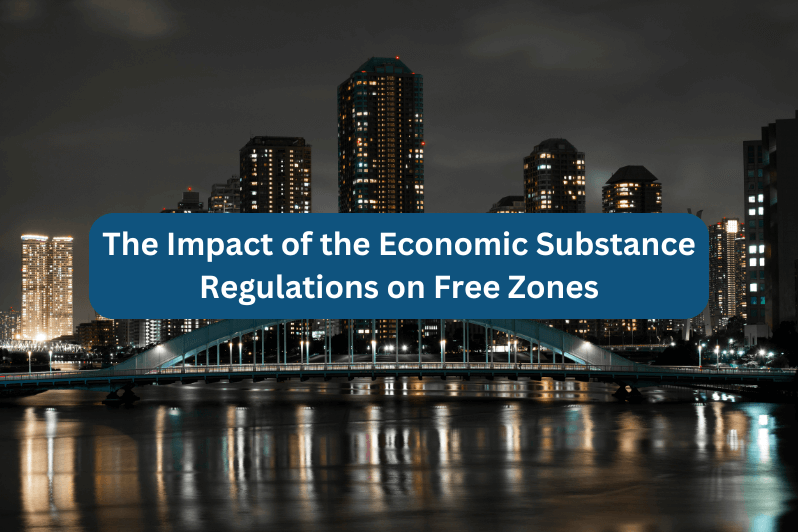The UAE’s economic substance regulations were introduced in 2019 as part of the country’s commitment to international standards on tax transparency and Base Erosion and Profit Shifting (BEPS). The regulations apply to all UAE onshore and free zone companies that engage in certain “relevant activities,” including banking, insurance, investment fund management, lease-finance, headquarters, shipping, holding company, intellectual property, and distribution and service center businesses. Under the regulations, companies must demonstrate that they have adequate substance in the UAE by meeting certain criteria, such as having a physical presence in the country, employing qualified staff, and incurring expenses. Companies that fail to meet these criteria may be subject to penalties, including fines and the revocation of their license.
Impact of ESR on Free Zones and Financial Free Zones
Free zones and financial free zones are a crucial part of the UAE’s economic landscape, offering a range of benefits to companies, including foreign ownership, tax exemptions, and streamlined business processes. However, the economic substance regulations have raised concerns about the continued attractiveness of these zones for businesses.
One of the key requirements of the ESR is that companies must have adequate substance in the UAE. This means that companies must have a physical presence in the country, including offices, staff, and equipment. Companies must also demonstrate that they are carrying out core income-generating activities in the UAE and that these activities are directed and managed from within the country.
For companies operating in free zones and financial free zones, meeting these requirements can be a challenge. Many of these companies have been established specifically to take advantage of the tax and regulatory incentives offered in these areas, and may not have a significant physical presence in the UAE. As a result, they may need to restructure their operations to ensure that they meet the substance requirements.
Examples of Restructuring Measures
There are several measures that companies operating in free zones and financial free zones can take to ensure that they meet the substance requirements of the ESR. These include:
- Establishing a physical office in the UAE: Companies that do not have a physical presence in the UAE may need to establish an office in the country. This can be done by leasing office space or by purchasing property.
- Hiring local staff: Companies may need to hire local staff to ensure that they have adequate substance in the UAE. This can include hiring employees to perform core income-generating activities, as well as administrative and support staff.
- Appointing a local director: Companies may need to appoint a local director to ensure that they have adequate oversight and management in the UAE. This can be done by appointing a UAE national or by hiring a third-party service provider.
- Maintaining adequate records: Companies must maintain adequate records to demonstrate that they meet the substance requirements of the ESR. This includes financial records, as well as records of board meetings and other key decisions.
Free Zones and Financial Free Zones Responding to the ESR
To address the concerns raised by the economic substance regulations, many free zones and financial free zones in the UAE have taken steps to support their businesses. For example, some zones have introduced new services and incentives to help companies meet the substance requirements, such as:
- Providing affordable and flexible office space solutions to meet the physical presence requirement
- Offering recruitment and staffing services to help companies hire qualified employees
- Providing access to local service providers to assist with expense management
Key Considerations for UAE Licensees Located in Free Zones
UAE Licensees located in free zones must assess their economic substance and adopt a “substance over form” approach. They must consider the CIGAs carried out in the free zone and provide documentary evidence supporting the CIGAs. The Licensee should be directed and managed in the UAE, and the directors should have the necessary knowledge and expertise to discharge their duties.
Companies in free zones and financial free zones must also comply with transfer pricing requirements, prepare audited financial statements, and meet other conditions prescribed by the UAE Minister. Failure to comply with the Regulations can result in penalties and a spontaneous exchange of information with the Foreign Competent Authority.
Impact on Investment
The ESR has also had an impact on investment in the UAE. While the regulations are intended to ensure that companies have real economic substance in the country, they may also deter some investors from establishing operations in free zones and financial free zones. This is because the substance requirements may increase the cost and complexity of doing business in the UAE.
However, it is important to note that the ESR is not intended to discourage foreign investment. Rather, they are intended to ensure that the UAE remains an attractive destination for legitimate business activity. By implementing the ESR, the UAE is demonstrating its commitment to international standards of tax transparency and fairness.
Conclusion
The economic substance regulations in the UAE have significantly impacted companies in free zones and financial free zones. Compliance with these regulations is necessary to maintain the benefits of operating in these zones, such as zero tax on profits and duty exemptions. While there are concerns about increased costs and complexity, free zones can support businesses by offering guidance and affordable solutions to navigate the regulations. Compliance involves assessing economic substance, providing documentary evidence, adhering to transfer pricing requirements, and meeting other conditions set by the UAE Minister.
Read More: Requirements for businesses to comply with Economic Substance Regulations

